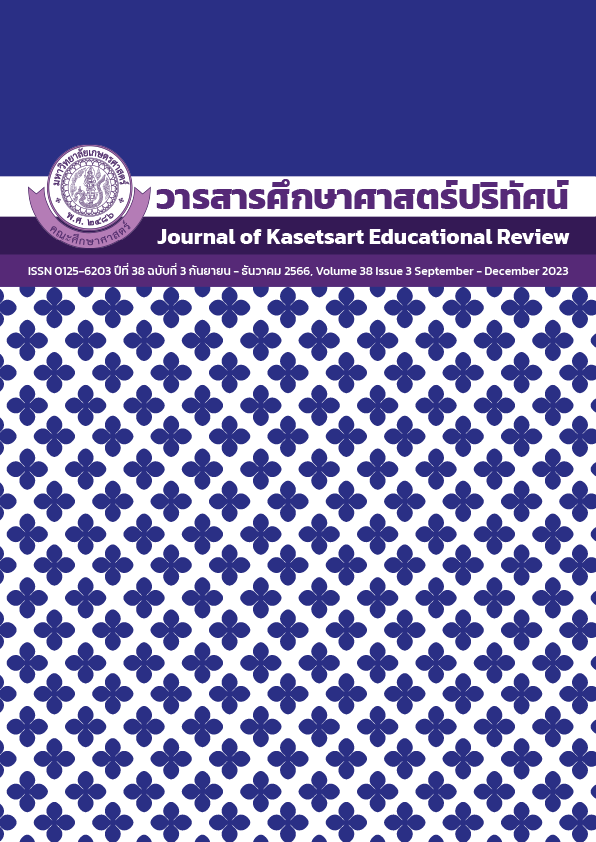แนวปฏิบัติที่ดีในการจัดการเรียนรู้โดยใช้ละครวิทยาศาสตร์ร่วมกับเครื่องมือไอซีทีในหน่วยการเรียนรู้เรื่องพันธุศาสตร์เพื่อพัฒนาทักษะการสื่อสารวิทยาศาสตร์ของนักเรียน ระดับชั้นมัธยมศึกษาปีที่ 4
คำสำคัญ:
การจัดการเรียนรู้โดยใช้ละครวิทยาศาสตร์ร่วมกับเครื่องมือไอซีที, ทักษะการสื่อสารวิทยาศาสตร์, พันธุศาสตร์บทคัดย่อ
การวิจัยเชิงปฏิบัติการในชั้นเรียนนี้มีวัตถุประสงค์เพื่อระบุแนวปฏิบัติที่ดีในการจัดการเรียนรู้โดยใช้ละครวิทยาศาสตร์ร่วมกับเครื่องมือไอซีที เพื่อพัฒนาทักษะการสื่อสารวิทยาศาสตร์ของนักเรียนระดับชั้นมัธยมศึกษาปีที่ 4 กลุ่มที่ศึกษาที่ใช้เป็นนักเรียนระดับชั้นมัธยมศึกษาปีที่ 4 แผนการเรียนวิทยาศาสตร์-คณิตศาสตร์ ภาคเรียนที่ 2 ปีการศึกษา 2564 จำนวน 32 คน ที่ได้รับการเลือกแบบเจาะจง ผู้วิจัยเก็บรวบรวมข้อมูลจากบันทึกหลังการจัดการเรียนรู้ อนุทินบันทึกการจัดการเรียนรู้ของผู้เรียน แบบสัมภาษณ์แบบกึ่งโครงสร้าง และแบบประเมินทักษะการสื่อสารวิทยาศาสตร์ ผู้วิจัยวิเคราะห์ข้อมูลเชิงคุณภาพด้วยการวิเคราะห์ข้อมูลแบบอุปนัย ผู้วิจัยพบว่าแนวปฏิบัติที่ดีในการจัดการเรียนรู้โดยใช้ละครวิทยาศาสตร์ร่วมกับเครื่องมือไอซีที ได้แก่ 1) การใช้ข่าวและบทความที่แปลกใหม่ประกอบการถามคำถามและอภิปรายผ่านห้องสนทนาย่อยด้วยแอปพลิเคชัน Zoom ร่วมกับการบันทึกสรุปองค์ความรู้ด้วย Google slide ช่วยกระตุ้นความสนใจและส่งเสริมการผลิตละครวิทยาศาสตร์ให้มีการสื่อสารด้านบริบทได้หลากหลาย 2) การกำหนดคำสำคัญและการเขียน Freytag’s pyramid ก่อนการเขียนบทละครช่วยกำหนดขอบเขตของเนื้อหาและช่วยตรวจสอบความถูกต้อง ครบถ้วน และการลำดับเนื้อหาได้ดี และ 3) การวิพากษ์วิจารณ์ผลงานด้วยคำถามเชิงสร้างสรรค์ร่วมกับการให้ข้อเสนอแนะย้อนกลับอย่างตรงประเด็นหลังการนำเสนอละครช่วยเติมเต็มความถูกต้องเชิงเนื้อหา การนำเสนอสิ่งแทนความและได้แนวทางการพัฒนาผลงานอย่างมีเป้าหมาย
เอกสารอ้างอิง
Abed, O.H. (2016). Drama-Based Science Teaching and Its Effect on Students' Understanding of Scientific Concepts and Their Attitudes towards Science Learning. International education studies, 9(10), 163-173.
Atjanawat, T. (2015). Development of science communication and teamwork abilities of eleventh grade students using group investigation (master’s thesis). http://cuir.car.chula.ac.th/handle/123456789/51076. [in Thai].
Baldwin, P., & Fleming, K. (2003). Teaching literacy through drama: Creative approaches: Routledge.
Battelle for Kids (2007). P21 framework definition. http://www.battelleforkids.org/networks/p21/frameworks-resources.
Bowater, L., & Yeoman, K.. (2013). Science communication: a practical guide for scientists. In. https://books.google.co.th/books?id=UGYe300kyXUC&printsec=frontcover#v=onepage&q&f=false
Cahill, H. (2013). Drama for health and human relationships education: aligning purpose and design. In M. Anderson & J. Dunn (Eds.). How drama Activates learning (178-193). London: Bloomsbury Academic.
Chamrat, S. (2020). Technology integrated learning. Bangkok: Fastbooks. [in thai].
Chang, H. P., Chen, C. C., Guo, G. J., Cheng, Y. J., Lin, C. Y. & Jen, T. H. (2011). The development of a competence scale for learning science: Inquiry and communication. International Journal of Science and Mathematics Education, 9(5), 1213-1233.
Cheevakul, K. (2019). Developing science communication skill of grade 11 students through socio-scientific issues-based teaching integrated ICT tools (master’s thesis). https://portal.lib.ku.ac.th/login?url=https://www.lib.ku.ac.th/KUthesis/2562/kamonchanok-che-all.pdf. [in Thai].
Chung, Y., Yoo, J., Kim, S.W., Lee, H., & Zeidler, D. L. (2016). Enhancing students’ communication skills in the science classroom through socioscientific Issues. International journal of science and mathematics education, 14(1), 1-27.
Davies, Sarah R, & Horst, Maja. (2016). Science communication: culture, identity and citizenship: Springer.
De Beer, J., Petersen, N., & Brits, S. (2018). The use of puppetry and drama in the biology classroom. The American Biology Teacher, 80(3), 175-181.
Jungwiwattanaporn, P. (2003). Creative drama using to develop learners. Bangkok, Thailand: Prik-Wan Graphic. http://backoffice.onec.go.th/uploads/Book/944-file.pdf. [in thai].
Kemmis, Stephen, & McTaggart, Robert. (1988). The action research reader. Geelong. Victoria: Deakin University Press.
Ketsing, J. (2022). Science classroom action research: A learning pathway for improving you. Bangkok: Fastbooks. [in thai].
Khemkong, S. (2017). The development of grade 11th student' Scientific reasoning ability by using inquiry-based learning. (master’s thesis). https://portal.lib.ku.ac.th/login?url= https://www.lib.ku.ac.th/KUthesis/2560/sirinoot-khe-all.pdf. [in Thai].
Kulgemeyer, Christoph, & Schecker, Horst. (2013). Students Explaining Science—Assessment of Science Communication Competence. Research in Science Education, 43(6), 2235-2256.
Malmfors, B., Garnsworthy, P., & Grossman, M. (2003). Writing and presenting scientific papers: Nottingham University Press.
Ministry of Education. (2017). Indicators and core learning content Science learning subject group
(Revised Edition C.E. 2017) according to the Core Curriculum of Basic Education C.E. 2008: The Agricultural Co-operative Federation of Thailand. [in thai].
Pitiporntapin, S. (2014). Science and communication. Bangkok: April rain printing. [in thai].
Pongsophon, P., Yutakom, N., & Boujaoude, S.B. (2010). Promotion of scientific literacy on global warming by process drama. Asia-Pacific Forum on Science Learning and Teaching, 11(1), 1-37.
Pongvora, S. (2008). Science drama with teaching science. IPST Magazine, 36(155), 82-84. [in thai].
Reunkampang, M. (2022). Science communication ability of grade 8 students learning through think pair share activity. Journal of Panya, 29(1), 85-97. [in Thai].
Saka, Arzu, Ebenezer, Jazlin, Çakır, Ilknur, & Saka, Ahmet Zeki. (2016). Pedagogy of creative drama in biology. Open Journal of Social Sciences, 4(03), 187.
Singnoi, W. (2017). 21st century learning skills of student. IPST Magazine, 45(208), 31-33. [in thai].
Sueangam, K. & Srisukvatananan, P. (2021). A development of on-task behavior in an inclusive classroom by using positive classroom management. Journal of Research and Development in Special Education, 10(2), 69-81. [in Thai].
Suwannawong, N. (2010). Dramatized experience for promoting scientific literacy on global warming. (master’s thesis). https://portal.lib.ku.ac.th/login?url= https://www.lib.ku.ac.th/KUthesis/2553/nanthiya-suw/index.html. [in Thai].
Teachakaew, S., Kijkuakul, S. & Booncham, U. (2020). Develop flipped classroom for encourage science communication skills in nervous system and structure and movement system. Journal of Education Naresuan University, 22(1), 262-272. [in Thai].
Treise, D. & Weigold, M.F. (2002). Advancing science communication: A survey of science communicators. Science Communication, 23(3), 310-322.
Warner, C.D. (2013). Drama and science: an unlikely partnership for inquiry. In M. Anderson & J. Dunn (Eds.). How drama Activates learning. London: Bloomsbury Academic.
Worakitchanon, Y. (2020). The development of 11th grade students’ science communication skill in the unit of digestive system using model-based inquiry teaching. (master’s thesis). [in Thai].
Yoon, H. G., Na, J. Y. & Jang, B. G. (2004). Case study on science drama in elementary school. Journal of the Korean Association for Science Education, 24(5), 902-915.
Yoon, H. G. (2006). The nature of science drama in science education. Paper presented at the 9th international conference on public communication of science and technology (PCST-9). Seoul, Korea.
ดาวน์โหลด
เผยแพร่แล้ว
ฉบับ
ประเภทบทความ
สัญญาอนุญาต
ลิขสิทธิ์ (c) 2023 วารสารศึกษาศาสตร์ปริทัศน์

อนุญาตภายใต้เงื่อนไข Creative Commons Attribution-NonCommercial-NoDerivatives 4.0 International License.
บทความทุกบทความเป็นลิขสิทธิ์ของวารสารคณะศึกษาศาสตร์ มหาวิทยาลัยเกษตรศาสตร์ วิทยาเขตบางเขน
วารสารศึกษาศาสตร์ปริทัศน์ (Kasetsart Educational Review)






